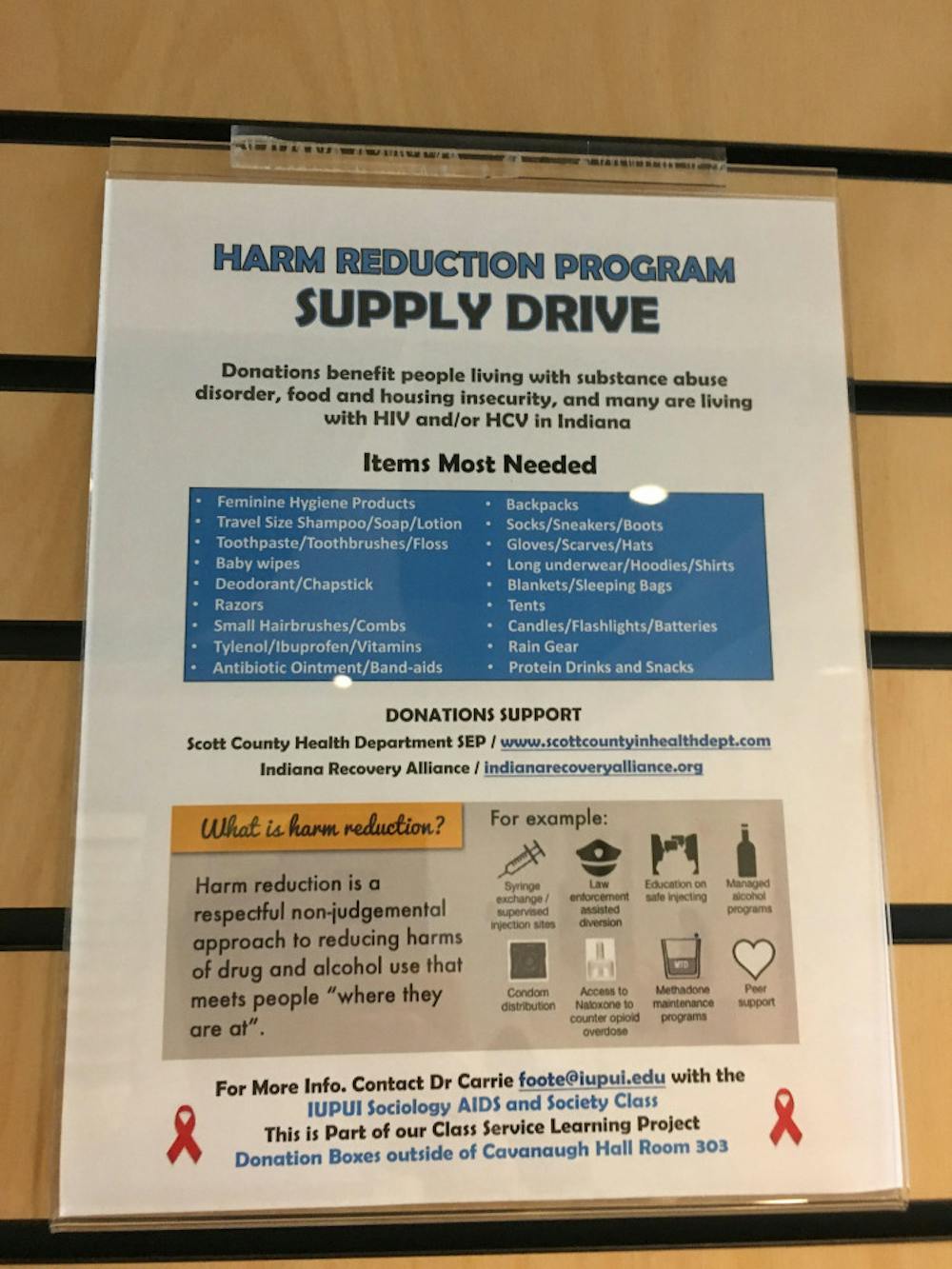For us students, a backpack is just a way of holding our laptops and expressing our styles. For them, a backpack is a portable home. For Dr. Carrie Foote, a backpack can be a way of connecting our communities through service.
This marks the first year of the Harm Reduction Program Supply Drive, run by Dr. Foote and her Sociology AIDS and Society Class. The Supply Drive is a way of collecting donations that benefit people living with substance abuse disorder, housing and food insecurity, and who are living with HIV in Indiana.
What exactly is harm reduction? Check out any of the Supply Drive posters and they’ll tell you. Harm reduction is a combination of ways to lessen the harms of drug and alcohol abuse. Most importantly, harm reduction is non-judgmental and “meets people where they are at.”
“These are people who have challenges,” said Dr. Foote.

If you frequent Cavanaugh Hall, you may have already seen the blue and white boxes on the third floor outside of the Sociology department. You may have even spotted a few blankets inside them, or a case of canned food. Every coat, toothbrush, and pair of socks are delivered to the Scott County Health Department, about a two hour drive south from campus, and the Indiana Recovery Alliance based in Bloomington.
When Dr. Foote first reached out to Scott County in 2016, she intended to find out what resources she could offer to the struggling community. Just the year before, Scott County captured national attention after a massive HIV outbreak among injection drug users in rural areas. Previously, there was a widespread belief that mass drug addiction and outbreaks only happened in urban cities. But in recent years, the opioid crisis has shifted the conversation – addiction can happen to anyone, anywhere. And Dr. Foote knows this better than most.
“I’m also a woman living with HIV,” she said in an interview. “I’ve been living with HIV for 30 years and I contracted HIV from injection drug use.”
After overcoming her addiction, she earned her PhD in Sociology and devoted her life to researching HIV/AIDS and the relationships between people living with HIV and their community. People who struggle with substance abuse disorder are constantly on her radar, and she invites others to join her in works of service.
Every semester, students from Sociology R385: AIDS and Society must complete a service-based experiential project. Typically, this entails donating needed materials to the Scott County Health Department and shadowing Health Department practitioners. But this year, Dr. Carrie Foote is extending the opportunity to the entire campus.
“This is the very first year that I’ve used the donation boxes in the hallways and the very first year that I also advertised around campus.”
So what do these donation boxes need most? One of the biggest needs are protein-based foods. Many sufferers of addiction don’t have electricity to power refrigerators or microwaves, so food items ought to be nonperishable. They also have limited access to dental care, so food must be soft and easily chewable as well.
Feminine hygiene products are also valuable. Donating menstrual products promotes health, comfort, and dignity.
For those who are homeless or who couch surf, backpacks are indispensable. Backpacks serve as a secure way to store belongings and keep food safe. Luckily, this is a college campus – backpacks shouldn’t be hard to come by.
Above all these items, the most requested item for people who are homeless are socks. Worn down from walking, weather exposure, and sweat, even a sturdy pair of socks will need to be replaced quickly. With the fall and winter seasons arriving, it’s also important to consider donating gloves, hats, and scarves.
Anybody can donate, and if you would like to set up a box your office or department, contact Dr. Carrie Foote.
Harm Reduction Drive at IUPUI

Heads up! This article was imported from a previous version of The Campus Citizen. If you notice any issues, please let us know.




